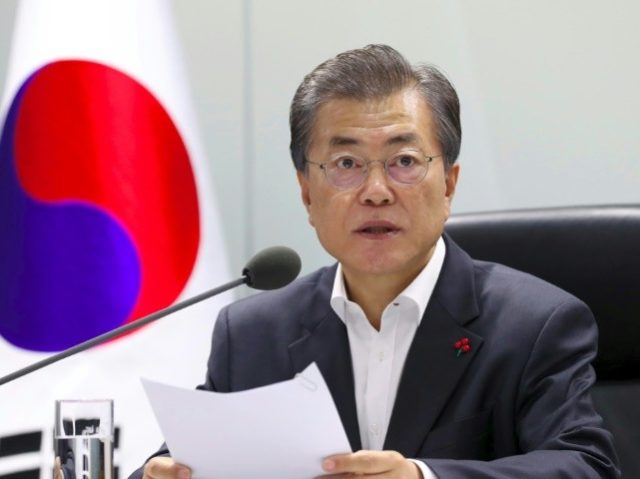South Korean President Moon Jae-in promised China a “new start” in diplomatic relations following a meeting with Chinese leader Xi Jinping on Thursday, following months of tensions caused by Seoul’s close relationship with the United States.
Under his predecessor, the conservative Park Geun-hye, South Korea signed a deal with American officials to install the advanced Terminal High Altitude Area Defense (THAAD) system on South Korean land, to ensure protection from incoming North Korean missiles. The THAAD system is so advanced, however, that it can reach deep into Chinese and Russian territory to detect and destroy incoming missiles, alarming the leadership of both nations.
Moon took office this year on a left-wing platform of seeking dialogue with North Korea and opposing the installation of the THAAD system. While he has postponed some of the project, Moon has gone forward with the complete installation of some THAAD launchers. During his visit to South Korea in November, U.S. President Donald Trump announced that Moon had agreed to significant weapons purchases from the United States, as well. Moon told reporters at the time, “We must maintain a strong stance toward North Korean threats based on overwhelming superiority of power.”
Yet Moon has raised eyebrows with soft proposals for cooperation with North Korea, including inviting the communist Kim regime to the 2018 Winter Olympics and reaching out to the Vatican for mediation.
Speaking to the leader of North Korea’s largest ally and trading partner, Moon promised to reduce tensions with China. “I believe that trust is most important not only in a relationship between persons but also between countries,” Moon said on Thursday, adding, “I wish to solidify the foundation for a new era in the relationship between the two countries based on trust and friendship between us two leaders.”
He identified North Korea as a particular challenge to both countries and one which they should work on together. “I hope we will reaffirm our countries’ joint stance to peacefully resolve the North Korean nuclear problem that threatens peace and security not only in Northeast Asia but the entire world, and discuss specific ways to cooperate,” Moon stated.
“China-South Korea relations and the Korean Peninsula are in a critical phase. As close and friendly partners, we share a joint vision of cooperation and mutual benefits in terms of protecting regional peace and promoting joint development,” he added.
South Korea’s Joongang Daily reports, citing sources, that Moon did not heavily pressure Xi into abandoning relations with North Korea. The newspaper describes his urging of limiting economic ties to Pyongyang as “roundabout,” quoting an unnamed official who reportedly said, “There was no specific request for an oil embargo. Moon said he expects China to play more of a role.”
Moon is in China for a four-day visit to commemorate the 25th anniversary of official diplomatic ties between the two countries, according to Chinese state media outlet Xinhua, which carried many of Xi’s statements to the press after his two-hour meeting in Beijing with Moon.
“There have been some twists and turns in China-ROK relations, which have provided enlightenment for both sides on how to create a better future together on the basis of mutual respect for each other’s core interests, said Xi,” Xinhua noted.
Missing from South Korean coverage of the meeting, but present in Xinhua, is Xi’s insistence on involving South Korea in the sprawling economic project China calls “One Belt One Road” (OBOR). The plan involves China investing billions in transportation and trade infrastructure on land and sea between Beijing and western Europe and would grant the Chinese Communist Party unprecedented control over trade and travel. While South Korea is not an obvious partner in such a move to revive the “Old Silk Road,” Xi reportedly pitched Moon a role in helping China build itself up.
“China welcomes the ROK’s participation in the Belt and Road construction, said Xi, hoping to promote the alignment of the Belt and Road Initiative with the ROK’s development strategy,” Xinhua reported, adding that Moon said “the ROK hopes to participate in the Belt and Road Initiative and promote the building of a community with a shared future for mankind.”
While Xinhua highlighted the potential OBOR cooperation, the Chinese Foreign Ministry refused to discuss North Korea at all in its reaction to coverage of Moon’s visit. “We appreciate the friendship President Moon Jae-in showed to the Chinese people on behalf of the ROK government and people,” Foreign Ministry spokesman Lu Kang told reporters on Thursday. “The two peoples have worked in unity and helped with each other in resisting the aggression of the Japanese colonialism and fighting for national liberation and made important contributions to the victory of the World Anti-Fascist War.”
On Wednesday, Lu refused to give a direct answer to a reporter asking about THAAD tensions. Instead, Lu replied, “The two state leaders will exchange in-depth views on bilateral relations. Besides, they will indeed discuss international and regional issues of mutual concern, and I’m not getting ahead of how the discussion will be held.”

COMMENTS
Please let us know if you're having issues with commenting.